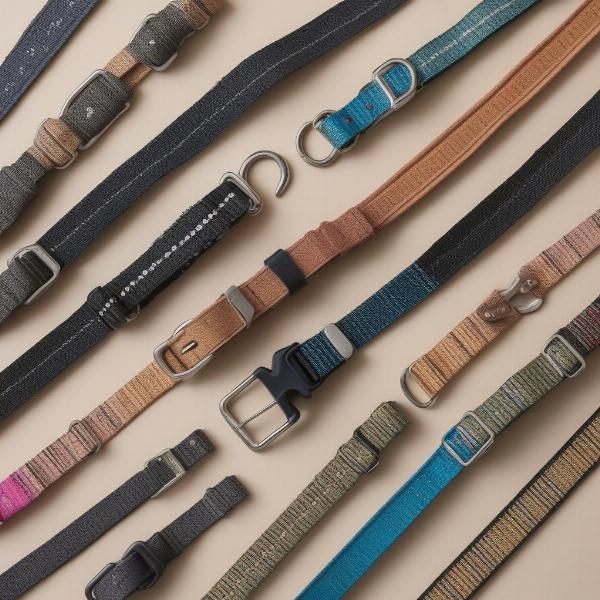Choosing the right collar for your Labrador is a crucial decision that impacts their comfort, safety, and overall well-being. Whether you have a playful puppy or a seasoned senior, this guide will help you navigate the world of labrador dog collars, providing practical advice and expert insights to ensure you make the best choice for your furry friend.
Understanding Your Labrador’s Needs
Labradors are known for their energetic nature and love for outdoor adventures. This active lifestyle necessitates a collar that can withstand their enthusiasm while remaining comfortable and secure. Consider your Labrador’s age, size, and activity level when selecting a collar. A puppy will require a smaller, adjustable collar, while a fully grown adult will need a more robust option.
Types of Labrador Dog Collars
From traditional flat collars to specialized training collars, there’s a wide variety of options available for Labradors. Let’s explore some of the most popular choices:
Flat Collars
Flat collars are the most common type of dog collar, typically made from nylon or leather. They are a simple and effective choice for everyday wear, featuring a buckle or quick-release clasp for easy on and off. plaid dog leashes and collars
Martingale Collars
Martingale collars are designed to prevent dogs from slipping out of their collars, making them an excellent choice for Labradors who are prone to pulling or escaping. These collars tighten gently when the dog pulls, providing a humane and effective way to maintain control.
Harness Collars
Harnesses distribute pressure evenly across the dog’s chest and shoulders, reducing strain on the neck. This makes them a good option for Labradors who pull excessively or have sensitive tracheas.
Training Collars
Training collars, such as prong collars or choke chains, should be used with caution and only under the guidance of a professional dog trainer. Improper use can cause physical and psychological harm to your Labrador.
 Different Types of Dog Collars
Different Types of Dog Collars
Choosing the Right Material
The material of your Labrador’s collar plays a significant role in its comfort and durability. Consider the following options:
Nylon
Nylon collars are durable, lightweight, and easy to clean, making them a practical choice for active Labradors. They are also available in a wide variety of colors and patterns.
Leather
Leather collars offer a classic and stylish look, becoming softer and more comfortable with age. However, they require more care and maintenance than nylon collars.
Biothane
Biothane is a waterproof and odor-resistant material that is incredibly durable and easy to clean, making it an excellent choice for Labradors who love water or muddy adventures.
What Size Collar Does My Labrador Need?
Measuring your Labrador’s neck is crucial for selecting the correct collar size. Use a flexible measuring tape and add two fingers’ width to ensure a comfortable fit. small to large dogs For puppies, choose an adjustable collar to accommodate their growth.
Do Labradors need special collars?
While Labradors don’t require a specific type of collar, their energetic nature and love for water may influence your choice. Durable, waterproof collars made from materials like biothane or coated nylon are excellent options.
Expert Insights
“Choosing the right collar for your Labrador is an investment in their comfort and safety,” says renowned dog trainer, Sarah Miller. “Consider your dog’s individual needs and activity level when selecting a collar, and always prioritize their well-being.”
Conclusion
Selecting the appropriate labrador dog collar involves careful consideration of your dog’s individual needs, lifestyle, and preferences. By understanding the various types, materials, and sizing options available, you can make an informed decision that prioritizes your Labrador’s comfort, safety, and overall happiness. black dog farm
FAQ
-
What type of collar is best for a Labrador puppy? An adjustable nylon or leather collar is ideal for a Labrador puppy, allowing you to adjust the size as they grow.
-
Can I use a training collar on my Labrador? Training collars should only be used under the guidance of a professional dog trainer to avoid potential harm.
-
How often should I clean my Labrador’s collar? Clean your Labrador’s collar regularly, especially if they enjoy swimming or playing in mud. The frequency will depend on the material and how dirty it gets.
-
What should I do if my Labrador’s collar is too tight? If your Labrador’s collar is too tight, loosen it immediately. You should be able to fit two fingers comfortably between the collar and your dog’s neck.
-
Where can I buy high-quality labrador dog collars? Reputable pet stores and online retailers offer a wide selection of high-quality labrador dog collars.
-
Are personalized collars a good idea for Labradors? Personalized collars with your dog’s name and contact information can be a helpful safety measure.
-
My Labrador keeps slipping out of his collar, what should I do? Consider a martingale collar or harness to prevent your Labrador from escaping.
ILM Dog is a leading international online resource dedicated to providing expert advice on all aspects of dog care, including breed selection, health, training, nutrition, grooming, and accessories. We combine the latest veterinary practices and pet care trends to offer valuable insights and support to dog owners worldwide. For more information on labrador dog collars and other essential pet care advice, visit our website at ILM Dog or contact us at [email protected] or +44 20-3965-8624. We’re here to help you provide the best possible care for your beloved companion.